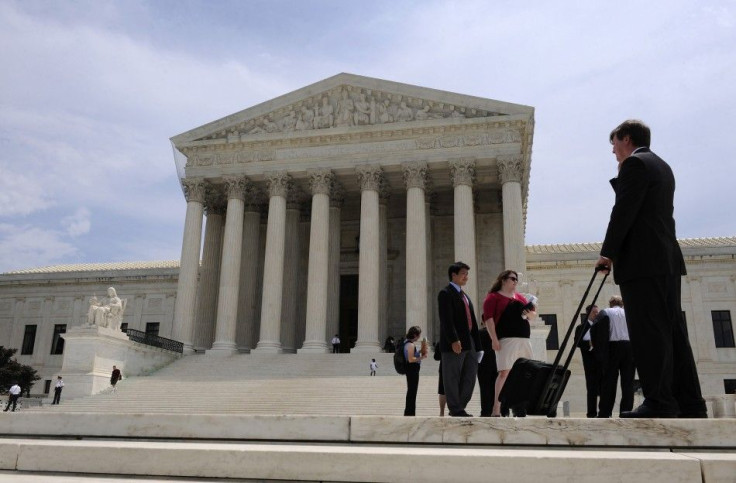Health Care Supreme Court Decision: Chief Justice Roberts Is Person Of The Day

While Republicans and most conservatives might well be disappointed by Thursday's U.S. Supreme Court decision to uphold President Barack Obama's Affordable Health Act, one of their own is the person of the day: Chief Justice John G. Roberts Jr.
Indeed, one might conclude that with his decision to be in the majority to uphold the law as well as its controversial individual mandate to buy a health care policy, Roberts Thursday stepped into history -- as a true conservative.
The idea might disturb the man who appointed Roberts, now 57, to the Supreme Court, in 2005, President George W. Bush, who originally nominated Roberts to be just an associate justice to replace Sandra Day O'Connor, who'd retired.
When Chief Justice William H. Rehnquist died two months later, Bush picked the then U.S. Court of Appeals Judge to be the 17th Chief Justice.
Everything in the manner of the Buffalo, N.Y., native suggested conservatism, through his undergraduate education and law school education at Harvard; serving as a law clerk to Rehnquist and legendary Court of Appeals Judge Henry Friendly; and service in the White House counsel's office under the first President Bush.
Roberts then worked for clients as a partner of Hogan & Hartson, a powerhouse Washington, D.C., firm with corporate clients. The second Bush installed him on the U.S. Court of Appeals for the Washington, D.C., Circuit in 2003, where Roberts continued to make his mark as a conservative jurist.
Perhaps a model for Roberts is Charles Evans Hughes, another Republican, who served as chief justice throughout the New Deal years of President Franklin D. Roosevelt, when the Supreme Court largely upheld many new legislative initiatives while striking down a handful as going too far, such as the National Recovery Act and the Agricultural Adjustment Act.
Indeed, there are some striking parallels between the court's 1935 decision to strike down the AAA, which first gave farmers subsidies, with Thursday's decision to uphold the Affordable Health Care Act.
In the AAA decision, the majority, including Hughes, determined the law went beyond the powers of the constitution to regulate interstate commerce. In that case, the court ruled it was a coercive measure, rather than a tax.
In his opinion on Obamacare, Roberts Thursday wrote concisely, Put simply, Congress may tax and spend. For Roberts, that meant that the so-called individual mandate that requires all citizens to buy an insurance policy is a form of tax. Therefore, it's constitutional.
Morever, Roberts also wrote our permissive reading of those powers [of Congress] is explained in part by a general reticence to invalidate the acts of the Nation's elected leaders.
Written like a true conservative, in the spirit of earlier chief justices like John Marshall and Hughes, Roberts wrote we possess neither the expertise nor the prerogative to make policy judgments. Those decisions are entrusted to our Nation's elected leaders, who can be thrown out of office if the people disagree with them. It is not our job to protect the people from the consequences of their political choices.
Roberts also agreed with liberal colleague Justice Ruth Bader Ginsburg that the commerce clause compels people to do things. He reasoned later that taxes that seek to influence conduct are nothing new. Some of our earliest federal taxes sought to defer the purchase of imported manufactured goods in order to foster the growth of domestic industry, or tariffs.
Indeed, Roberts even cited Benjamin Franklin's dictum that in this world, nothing can be said to be certain except death and taxes.
Simply, because the constitution permits such a tax, it is not our role to forbid it, the chief justice wrote.
Congress can't force people to buy health insurance but it can set national standards and levy a tax in those who don't buy insurance, Roberts reasoned.
With this fundamentally conservative argument, he became the person of the day, not willing to be an expansive judge who strikes down laws that dealt with social change, much like Chief Justice Hughes upheld the New Deal laws like Social Security and the Wagner Labor Relations Act.
In recent weeks, conservatives such as former Sen. Alan Simpson, R-Wyo., have said they would be considered RINOs -- Republicans in Name Only -- if they sought to sit with their Republican colleagues in Congress today.
Sen. Olympia Snowe, R-Maine, decided to retire this year because she was tired of the extremism of the Republican caucus, which marginalized a moderate conservative like her.
For sure, George W. Bush may be having second thoughts about John Roberts on Thursday. But in the judicial afterlife, Roberts' predecessors like John Marshall, Charles Evans Hughes -- and that other Republican, Earl Warren -- are probably saying, Well done!
© Copyright IBTimes 2025. All rights reserved.






















